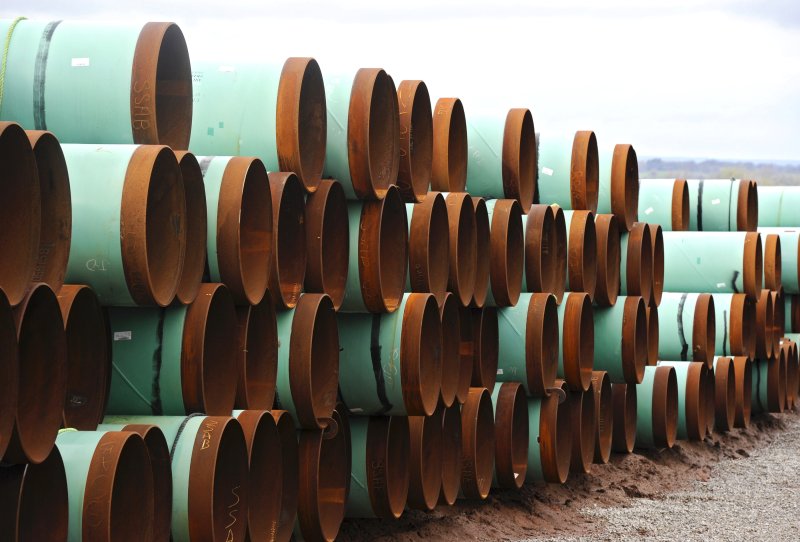A file picture dated 21 March 2012 shows piping to be used for the Keystone XL pipeline. This week, several North American tribes sued the Trump Administration to reverse a permit granted to TransCanada to build the pipeline on grounds it violates federal law. File Photo by Larry W. Smith/EPA
Sept. 11 (UPI) -- Three Native American tribes in Montana and South Dakota filed a lawsuit against the Trump Administration this week to rescind the 2017 permit to build the Keystone XL Pipeline.
The Rosebud Sioux, Fort Belknap Indian Community and Gros Ventre tribes say the Trump Administration granted TransCanada the permit without a proper study of the impacts a massive pipeline project would have on the land, which violates the National Environmental Policy Act and the National Historic Preservation Act.
"Throughout the permitting process, there was no analysis of trust obligations, no analysis of treaty rights, no analysis of the potential impact on hunting and fishing rights, no analysis of potential impacts on the Rosebud Sioux Tribe's unique water system, no analysis of the potential impact of spills on tribal citizens and no analysis of the potential impact on cultural sites in the path of the pipeline," the Native American Rights Fund, the group representing the tribes, said in a statement.
The tribes also contend that President Donald Trump had a personal financial stake in the pipeline because a 2015 personal public financial disclosure report filed with the Federal Election Commission revealed he held between $250,000 and $500,000 worth of stock in TransCanada.
"President Trump permitted the Keystone XL pipeline because he wanted to. It was a political step, having nothing to do with what the law actually requires," said NARF staff attorney Natalie Landreth.
President Barack Obama rejected the Keystone Pipeline in November 2015 on grounds that it would not make a "meaningful long-term contribution" to the economy and fail to lower gas prices.
But in March 2017, Trump reversed that decision and said it would "lower costs for American families...reduce our dependence on foreign oil and create thousands of jobs right here in America."
According to State Department figures reported by NPR, the Keystone Pipeline would create less than 2,000 temporary construction jobs over a 2-year period and about 35 full-time jobs once the pipeline is completed.















